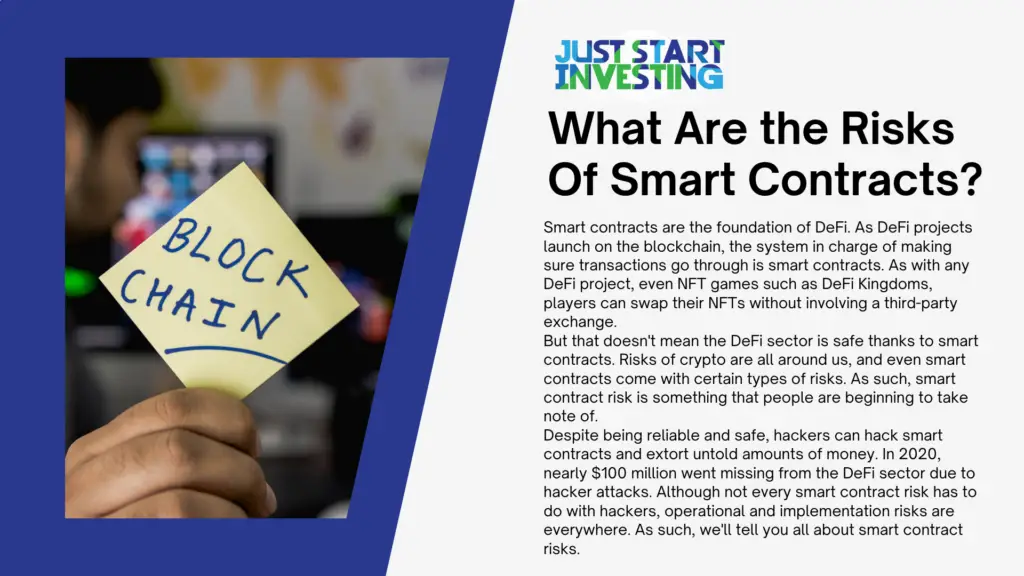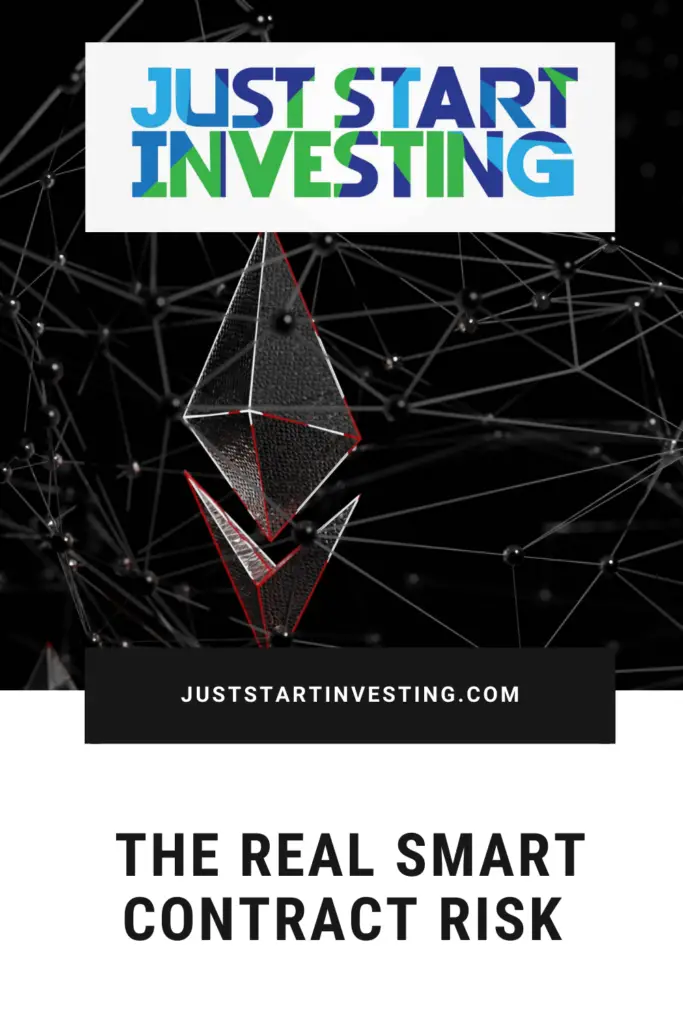Blockchain is a term that not many people fully understand. In essence, the blockchain is a public and decentralized digital ledger. Technologies developed on the blockchain further add functionalities and opportunities. One of these technologies is smart contracts. Smart contracts solve a very unique problem, but they also come with risks.
The purpose of this technology is to eliminate the use of third parties. They are fully digital and on the blockchain. Smart contracts use a set of goals that require fulfillment before the transaction can go through.
But are real smart contracts risky? Is this a perfect system with no flaws? In this short guide, we will talk about the risks associated with smart contracts.
What Are the Risks Of Smart Contracts?
Smart contracts are the foundation of DeFi. As DeFi projects launch on the blockchain, the system in charge of making sure transactions go through is smart contracts. As with any DeFi project, even NFT games such as DeFi Kingdoms, players can swap their NFTs without involving a third-party exchange.
But that doesn’t mean the DeFi sector is safe thanks to smart contracts. Risks of crypto are all around us, and even smart contracts come with certain types of risks. As such, smart contract risk is something that people are beginning to take note of.
Despite being reliable and safe, hackers can hack smart contracts and extort untold amounts of money. In 2020, nearly $100 million went missing from the DeFi sector due to hacker attacks. Although not every smart contract risk has to do with hackers, operational and implementation risks are everywhere. As such, we’ll tell you all about smart contract risks.

Too Much Reliance On Code
Human error is a huge reason why companies stay away from smart contracts. Without access to experts that can code the technology correctly, they become an operational risk. Since the technology is designed to approve a contract once parameters are met, the code can be changed so that an unauthorized person can hijack the contract and steal the funds.
Developers with malicious intent are a huge smart contract risk that everyone looking to get into the tech should pay close attention to.
DeFi Is A Copy-Paste Financial System
DeFi, by definition, is open source. What this tells us is that anyone can copy the code from a DeFi project and repackage it under a different umbrella. With this in mind, they can immediately launch protocols and distribute tokens without anything backing it. As such, it’s very easy to create a scam project where investors get their funds stolen by shady developers. DeFi hopes to solve a lot of problems that come with modern financial systems, but it is still a system where anyone can copy any protocol.
Governance Is A Double-Edged Sword
One smart contract risk comes as a side effect of one of the very first reasons we have smart contrast – governance. Through smart contracts, a project can distribute governance tokens to investors. If enough investors hold a majority over the project, they can effectively seize control of the project. While not every governance token grants ownership rights, they come with voting power. This means investors can vote on changes before they can be made. As one can imagine, the smart contract can create a significant security risk. If the wrong changes are voted and implemented, it could pose an end to investors and the money they’ve invested.
Unclear On Regulations
With all that said, one inherent smart contract risk, and risk of investing in cryptocurrency in general, is the fact that it is unregulated. Businesses are already using smart contracts as a form of official agreement. While they’re not as common as an agreement you would sign on a piece of paper, multi-million dollar transactions are occurring between businesses all the time.
It is unclear what can potentially happen in the future once the sphere becomes more regulated. Since a portion of the cryptocurrency industry wants crypto to be regulated, we have no idea as to what that means for smart contracts. Over time, we will find ways to make the technology better, and hopefully, put an end to all risks of crypto.
Until then, smart contract risks will exist. But we should stress that smart contracts come with tons of benefits. Seeing they’re a paperless business tool, smart contracts process very fast. In addition, they are highly accurate and fairly difficult to human tampering. While risks do exist, they are very uncommon and very few.
How To Prevent Smart Contract Risks?
DeFi is new and we will see a lot of changes in the coming years. One of the main concerns of Decentralized Finance is mitigating smart contract risks. But how does the industry mitigate crypto risks? Well, one way to make smart contracts even more secure is to conduct audits. Before deploying a protocol, running an audit will tell developers if the smart contract can be tampered with. This will eliminate errors and protect investor funds.
When looking at it from a user’s point of view, one way to prevent any smart contract risk is to stay away from shady protocols. Due diligence is the least you can do before putting money in any smart contract protocol. But considering that very few people like to do their due diligence, smart contract risks will exist until we come up with a more sophisticated version of DeFi.
Finishing Thoughts
Although smart contracts aren’t perfect, they present us with a unique opportunity. Many crypto enthusiasts are excited about the technology that the blockchain powers. Smart contracts are one of the more promising techs that eliminate third parties. This doesn’t only mean banks and financial institutions. Smart contracts eliminate the dependence on courts, arbitrations, sureties, and more. On top of that, they present us with an alternative that is very secure and very fast.
But human error and greed will always hover over crypto in the form of negative stigma. Until we perfect the DeFi sector, smart contract risks will exist.

Partner at Vega Capital Management - a private funds management company.
An experienced portfolio manager with 10+ years of proven and reputable track record in investment management and financial analysis. Currently, a partner at one of the fastest-growing private fund management companies in southeast Europe, Kiril has been tending to a loyal international base of client-investors and partners. When he is not crunching numbers and increasing his client’s wealth, he reminisces about his Michelin-star restaurant cheffing years and fondness of the culinary arts.


